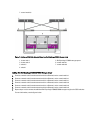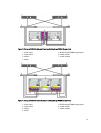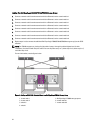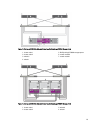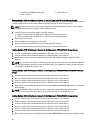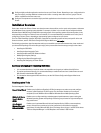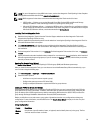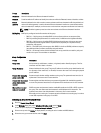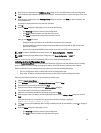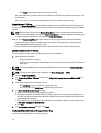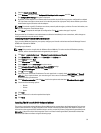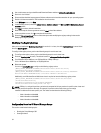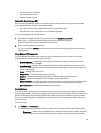12. Configure highly-available applications and services on your Failover Cluster. Depending on your configuration, this
may also require providing additional volumes to the cluster or creating new cluster resource groups. Test the
failover capabilities of the new resources.
13. Configure client systems to access the highly-available applications and services that are hosted on your Failover
Cluster.
Installation Overview
Each cluster node in the Failover Cluster must have the same release, edition, service pack, and processor architecture
of the Windows Server operating system installed. For example, all nodes in your cluster may be configured with the
Windows Server 2003 R2, Enterprise x64 Edition operating system. If the operating system varies among nodes, it may
not be possible to configure a Failover Cluster successfully. It is recommended that you establish server roles prior to
configuring a Failover Cluster, depending on the operating system configured on your cluster.
For a list of Dell PowerEdge systems, iSCSI NICs, supported list of operating system variants, and specific driver and
firmware revisions, see the
Dell Cluster Configuration Support Matrices
at dell.com/ha.
The following sub-sections describe steps that enable you to establish communication between the cluster nodes and
your shared Dell EqualLogic PS series storage array(s), and to present disks from the storage array(s) to the cluster:
• Installing the iSCSI NICs
• Installing the Host Integration Tools
• Installing the Microsoft iSCSI Software Initiator
• Modifying the Registry Settings
• Configuring the Shared Storage Array(s)
• Installing and Configuring a Failover Cluster
Additional Information For Installing iSCSI NICs
• It is recommended that you install the latest and compatible service packs or hotfixes of the NIC driver.
• For optimal performance benefit, it is recommended that you enable Flow Control and Jumbo Frames on each
NIC and switch that handles iSCSI traffic.
• For information about supported NICs and drivers, see the
Dell Cluster Configuration Support Matrices
at
dell.com/ha.
Host Integration Tools
The Host Integration Tools include:
Remote Setup Wizard Enables you to initialize an EqualLogic PS Series storage array and to set up and configure
access to a Dell EqualLogic PS Series group. The wizard also enables you to configure
multipath I/O on the Windows Server 2003 and Windows Server 2008 operating system.
Multipath I/O Device
Specific Module
(DSM)
Enables you to configure multiple redundant network paths between a system running the
Windows operating system and EqualLogic PS Series group volumes for high availability and
high performance.
Auto-Snapshot
Manager/Microsoft
Edition (ASM/ME)
Enables you to implement Microsoft Volume Snapshot Service (VSS) to create snapshots,
clones, and replicas to provide point-in-time protection of critical data for supported
applications, including Microsoft SQL Server, Exchange Server, Hyper-V, and NTFS file shares.
The Auto-Snapshot Manager is a VSS Requestor and includes a VSS Provider.
28



